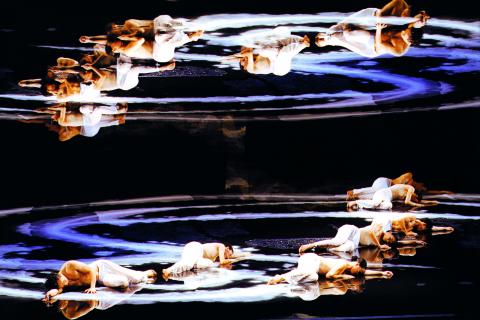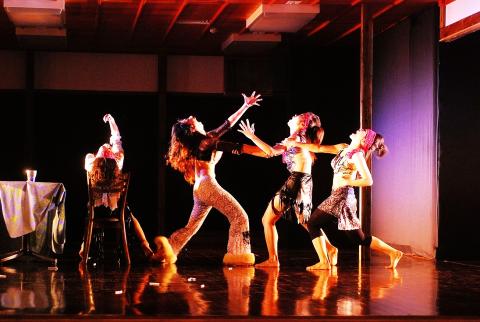This time of year usually finds the Cloud Gate Dance Theatre (雲門舞集) taking up residence at the National Theater in Taipei for two productions, one old, one new. However, knowing that the theater would be closed for renovations until early next year, and with a very busy year of international tours, Cloud Gate founder and artistic director Lin Hwai-min (林懷民) decided to stay home this month at the troupe’s own theater in Tamsui District (淡水), New Taipei City.
The company will begin an eight-show run of Lin’s iconic 1988 creation, Moon Water (水月), on Thursday next week, followed by a shorter run of Songs of the Wanderers (流浪者之歌), beginning Nov. 24.
It will be a bittersweet month for Lin, his dancers and audiences alike because both productions have become so enmeshed in the company’s identity and have long been part of their international tours, yet Lin has decided to retire Songs, which premiered in 1994, from the company’s repertoire — temporarily, everyone swears.

Photo Courtesy of Lui Chen-hsiang
While there are still tickets left for the evening performances of Moon Water, all four shows of Songs sold out weeks ago.
However, staying home at the Cloud Gate Theatre means that adjustments have to be made to both shows, as the stage is smaller and the front rows are so close. Lin already knew what adjustments had to be made for Moon Water, as the troupe gave four performances of the show in October last year as part of the Tamsui complex’s inaugural year.
“I didn’t change the choreography, but had to change some of the spacing,” Lin said in a telephone interview on Tuesday. “I just respaced Songs of the Wanderers, this week I will respace Moon Water.”

Photo Courtesy of Michael Yang
However, he did eliminate the overhead mirror that I feel has such dramatic impact in the latter part of Moon Water.
“It’s huge and metal and doesn’t create anything … it is just too claustrophobic. We could do it, technically, but it’s so close it looks gigantic,” he said.
Lin said there are benefits to being at close quarters with the audience.
“You are really breathing along with the dancers. The [audience’s] focus, the concentration, the breathing — it is all with the dancers,” he said.
While Lin has often said that Songs is his favorite creation, he said Moon Water is “really a piece that brings comfort to me and to audiences.”
As he reminded me, it was cited for “Best Choreography” at the Lyon Biennial Festival in 2000 and topped the New York Times’ list of “Best Dance Productions” of 2003.
It certainly proved a winner on the company’s recent five-city tour of China that began in mid-August, drawing “fabulous long reviews and articles from academics,” Lin said, and 80 to 90 percent of the audiences staying for the after-show talks.
“Audiences went crazy... It appeals on so many more levels to Chinese than Westerners — the Buddhism, the Taoism especially, because it is a play on yin and yang, effortlessness and effort; it really speaks to them,” he said.
Moon Water, set to Johann Sebastian Bach’s Six Suites for Solo Cello, was choreographed based on taichi movements developed by the company’s first taichi instructor, Hsiung Wei (熊衛).
It has always been a difficult piece for the troupe’s newcomers to fit into because the older dancers have had years of meditation, taichi and breathing training that make the slow, contemplative movements seem like second nature to them.
However, Lin said he is really proud of what his younger dancers have accomplished with the piece.
“You will be shocked how well they do. They grew up in the five-city tour of China,” he said.
For those thinking of heading out to Tamsui to see the Cloud Gate shows, it is worth planning ahead as the theater organizes shuttle buses from the Tamsui MRT station for all shows, but reservations for next week must be made by Monday, either through the company’s Web site or by telephone (02) 2629-8558, extension 3404) and the following Monday for that week’s shows.
Tsai Jui-Yueh Festival
Meanwhile, dance lovers this weekend will have a chance to see some other old favorites at the Tsai Jui-Yueh International Dance Festival XI (第十一屆蔡瑞月國際舞蹈節) at the Rose Historic Site (玫瑰古蹟).
The festival began in 2006 to commemorate the death of Taiwanese modern dance pioneer Tsai Jui-yueh (蔡瑞月), who died in 2005 in exile in Australia. Held in and around the Japanese-style building that was Tsai’s dance studio for decades, it is a platform for international dance and cultural exchange, with a different theme each year.
Tsai trained in Taiwan and Japan, but her marriage to poet and literature professor Lei Shih-yu (雷石榆) in 1947 ended up ensnaring the dancer in White Terror era politics and damaging her family and career. Her husband was deported to China, while she ended up jailed for three years on Green Island as a political prisoner. After her release she returned to Taipei and resumed teaching dance, but was heavily monitored by the authorities.
She moved to Australia in 1983 to live with her son, who was working there as a dancer, but her dance school and legacy have been maintained every since by her daughter-in-law, Ondine Hsiao (蕭渥廷), and one of her students, Hsiao’s sister, Grace Hsiao (蕭靜文).
Grace now lives in the US with her family, but returns each year to help with the festival.
The theme of this year’s festival is “The Judicial Justice,” and the works on the program are by Tsai, her Japanese teacher, Ishii Baka, and his daughter, Ishii Midori, Colombian-American black activist dancer Eleo Pomare and Pomare’s colleague, Martial Roumain, several of which have been performed at previous festivals.
They include Tsai’s 1978 Sailing on the Same Boat (同舟), one movement from Ishii Midori’s 1963 Brandenburg Concerto, Ishii Baku’s To Climb a Mountain (1925) and Spirit of Serpent (1933), Pomare’s 1972 Limousine for Janis and Roumain’s 1991 Elegy.
Limousine for Janis was choreographed as a eulogy for Janis Joplin, Jimi Hendrix and other superstars who overdosed on drugs and alcohol, while Elegy is a solo created “to remember a passing loved one.”
Performance Notes
What: Moon Water
When: Thursday and Nov. 11 at 8pm; Nov. 12 and Nov. 13 at 3pm; Nov. 17 and Nov. 18 at 8pm; Nov. 19 and Nov. 20 at 3pm
Where: Cloud Gate Theater (淡水雲門劇場), 36, Ln 6, Zhongzheng Rd Sec 1, Tamsui District, New Taipei City (新北市淡水區中正路一段6巷36號)
Admission: NT$1,500 to NT$2,000; available at NTCH box offices, online at www.artsticket.com.tw or www.service@cloudgate.org.tw and at convenience store kiosks nationwide. The Nov. 12, 19 and 20 matinees are sold out.
What: Tsai Jui-Yueh International Dance Festival XI
When: Tomorrow through Sunday at 7:45pm, Saturday and Sunday matinees at 3pm
Where: Tsai Jui-yueh Dance Research Institute/Rose Historic Site (蔡瑞月舞蹈社/玫瑰古蹟), Lane 46, Zongshan N Rd Sec 2 (台北市中山北路二段46巷進場)
Admission: NT$1,000; available at NTCH box offices, online at www.artsticket.com.tw, at convenience store kiosks or at the door. Tomorrow and Saturday night’s shows are sold out.

April 14 to April 20 In March 1947, Sising Katadrepan urged the government to drop the “high mountain people” (高山族) designation for Indigenous Taiwanese and refer to them as “Taiwan people” (台灣族). He considered the term derogatory, arguing that it made them sound like animals. The Taiwan Provincial Government agreed to stop using the term, stating that Indigenous Taiwanese suffered all sorts of discrimination and oppression under the Japanese and were forced to live in the mountains as outsiders to society. Now, under the new regime, they would be seen as equals, thus they should be henceforth

Last week, the the National Immigration Agency (NIA) told the legislature that more than 10,000 naturalized Taiwanese citizens from the People’s Republic of China (PRC) risked having their citizenship revoked if they failed to provide proof that they had renounced their Chinese household registration within the next three months. Renunciation is required under the Act Governing Relations Between the People of the Taiwan Area and the Mainland Area (臺灣地區與大陸地區人民關係條例), as amended in 2004, though it was only a legal requirement after 2000. Prior to that, it had been only an administrative requirement since the Nationality Act (國籍法) was established in

Three big changes have transformed the landscape of Taiwan’s local patronage factions: Increasing Democratic Progressive Party (DPP) involvement, rising new factions and the Chinese Nationalist Party’s (KMT) significantly weakened control. GREEN FACTIONS It is said that “south of the Zhuoshui River (濁水溪), there is no blue-green divide,” meaning that from Yunlin County south there is no difference between KMT and DPP politicians. This is not always true, but there is more than a grain of truth to it. Traditionally, DPP factions are viewed as national entities, with their primary function to secure plum positions in the party and government. This is not unusual

US President Donald Trump’s bid to take back control of the Panama Canal has put his counterpart Jose Raul Mulino in a difficult position and revived fears in the Central American country that US military bases will return. After Trump vowed to reclaim the interoceanic waterway from Chinese influence, US Defense Secretary Pete Hegseth signed an agreement with the Mulino administration last week for the US to deploy troops in areas adjacent to the canal. For more than two decades, after handing over control of the strategically vital waterway to Panama in 1999 and dismantling the bases that protected it, Washington has